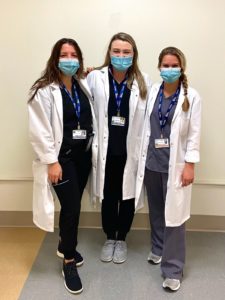June is both Alzheimer’s & Brain Awareness Month and Dysphagia Awareness Month. This month, we take a moment to help raise dementia and dysphagia awareness and their related co-morbidities. Nearly six million people in the United States are living with Alzheimer’s disease. As the sixth-leading cause of death and the only leading disease without a prevention, treatment, or cure, Alzheimer’s kills more Americans every year than breast cancer and prostate cancer combined.
While over 1 million Americans are diagnosed with dysphagia every year, there is still a lot of misunderstanding as it relates to the condition specifically as it relates to Alzheimer’s and other dementias. Dysphagia can be a challenging diagnosis that often leaves patients, caregivers, and clinicians looking for answers for support.
Speech-language pathologists in skilled nursing facilities play a critical role in the process of identifying, treating, and management of dysphagia. Dysphagia may be quite common in individuals with moderate dementia—the prevalence of dysphagia in moderate-to-severe Alzheimer’s disease has been estimated between 84% to 93% (Affoo, Foley, et al. 2013).
Individuals even with moderate dementia may experience dysphagia characterized by oral deficits including oral holding (stasis), prolonged or non-productive chewing, and pharyngeal (throat) deficits, including delayed initiation of the swallow, reduced movement or elevation of muscles, laryngeal penetration or aspiration, which may lead to aspiration pneumonia (Feinberg, Ekberg et al. 1992, Horner, Alberts et al. 1994, Priefer and Robbins 1997, Wada, Nakajoh et al. 2001, Garon, Sierzant et al. 2009, Suh, Kim et al. 2009, Humbert, McLaren et al. 2010, Affoo, Foley et al. 2013). These individuals may also develop food agnosia (not recognizing food as food), and perceptual and spatial deficits resulting in difficulties recognizing food and utensils (Logemann 1998).
Unfortunately, eating and swallowing deficits tend to increase in individuals as dementia progresses. In a study of 323 nursing home residents with advanced dementia observed for a period of 18 months, 86% were observed to have eating problems, including swallowing or chewing problems, refusal to eat or drink, suspected dehydration, and persistently reduced oral intake (Mitchell, Teno et al. 2009).
A highly skilled speech-language pathologist plays an important role in properly assessing, treating, and managing dysphagia in individuals with dementia. Dementia like many other progressive diseases requires ongoing assessment and modifications to ensure that the individual continues to be safe and relatively free of the risk of aspiration pneumonia. Therefore, it is important that speech therapy performs regular screens on long-term patients to ensure they are on the safest, yet least restrictive diet possible.
About the author: Michael V. Webb, MS CCC-SLP, Chief Executive Officer of Language Fundamentals. Michael is a graduate from the College of Saint Rose in Albany NY with his Master’s degree in Communication Disorders and more recently earned his Masters of Healthcare Administration from the University of Ohio. He has presented at the American Speech-Language and Hearing Association, the New York Speech-Language-Hearing Association, the New York State Health Facilities Association, as well as the National Convention of State Veterans Homes.



